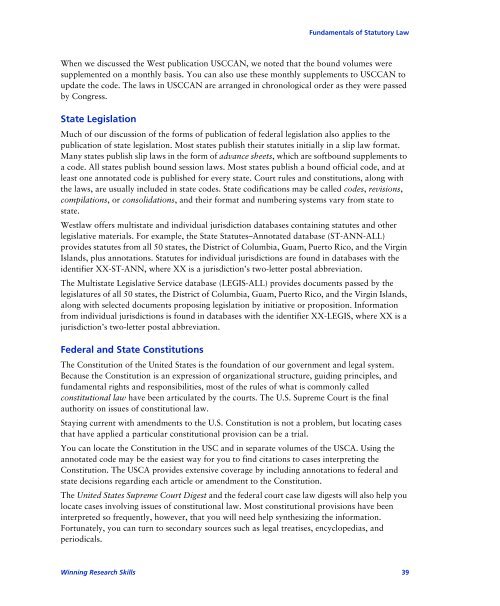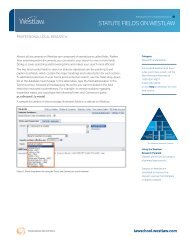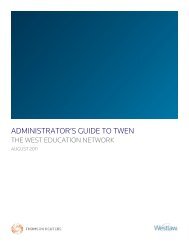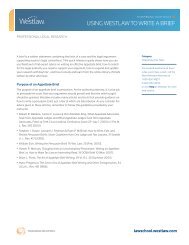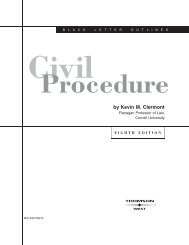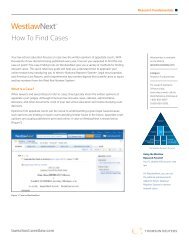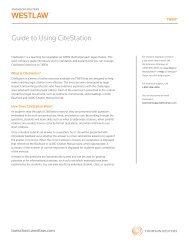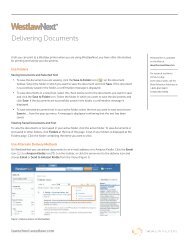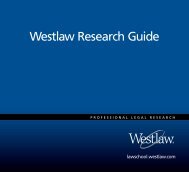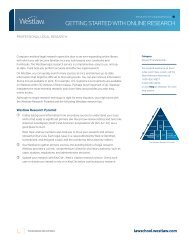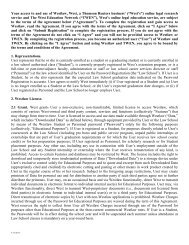Winning Research Skills - Westlaw
Winning Research Skills - Westlaw
Winning Research Skills - Westlaw
Create successful ePaper yourself
Turn your PDF publications into a flip-book with our unique Google optimized e-Paper software.
Fundamentals of Statutory Law<br />
When we discussed the West publication USCCAN, we noted that the bound volumes were<br />
supplemented on a monthly basis. You can also use these monthly supplements to USCCAN to<br />
update the code. The laws in USCCAN are arranged in chronological order as they were passed<br />
by Congress.<br />
State Legislation<br />
Much of our discussion of the forms of publication of federal legislation also applies to the<br />
publication of state legislation. Most states publish their statutes initially in a slip law format.<br />
Many states publish slip laws in the form of advance sheets, which are softbound supplements to<br />
a code. All states publish bound session laws. Most states publish a bound official code, and at<br />
least one annotated code is published for every state. Court rules and constitutions, along with<br />
the laws, are usually included in state codes. State codifications may be called codes, revisions,<br />
compilations, or consolidations, and their format and numbering systems vary from state to<br />
state.<br />
<strong>Westlaw</strong> offers multistate and individual jurisdiction databases containing statutes and other<br />
legislative materials. For example, the State Statutes–Annotated database (ST-ANN-ALL)<br />
provides statutes from all 50 states, the District of Columbia, Guam, Puerto Rico, and the Virgin<br />
Islands, plus annotations. Statutes for individual jurisdictions are found in databases with the<br />
identifier XX-ST-ANN, where XX is a jurisdiction’s two-letter postal abbreviation.<br />
The Multistate Legislative Service database (LEGIS-ALL) provides documents passed by the<br />
legislatures of all 50 states, the District of Columbia, Guam, Puerto Rico, and the Virgin Islands,<br />
along with selected documents proposing legislation by initiative or proposition. Information<br />
from individual jurisdictions is found in databases with the identifier XX-LEGIS, where XX is a<br />
jurisdiction’s two-letter postal abbreviation.<br />
Federal and State Constitutions<br />
The Constitution of the United States is the foundation of our government and legal system.<br />
Because the Constitution is an expression of organizational structure, guiding principles, and<br />
fundamental rights and responsibilities, most of the rules of what is commonly called<br />
constitutional law have been articulated by the courts. The U.S. Supreme Court is the final<br />
authority on issues of constitutional law.<br />
Staying current with amendments to the U.S. Constitution is not a problem, but locating cases<br />
that have applied a particular constitutional provision can be a trial.<br />
You can locate the Constitution in the USC and in separate volumes of the USCA. Using the<br />
annotated code may be the easiest way for you to find citations to cases interpreting the<br />
Constitution. The USCA provides extensive coverage by including annotations to federal and<br />
state decisions regarding each article or amendment to the Constitution.<br />
The United States Supreme Court Digest and the federal court case law digests will also help you<br />
locate cases involving issues of constitutional law. Most constitutional provisions have been<br />
interpreted so frequently, however, that you will need help synthesizing the information.<br />
Fortunately, you can turn to secondary sources such as legal treatises, encyclopedias, and<br />
periodicals.<br />
<strong>Winning</strong> <strong>Research</strong> <strong>Skills</strong> 39


